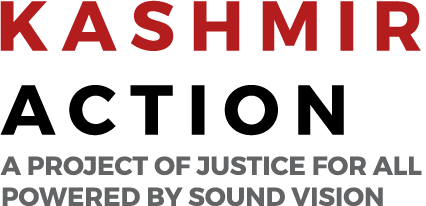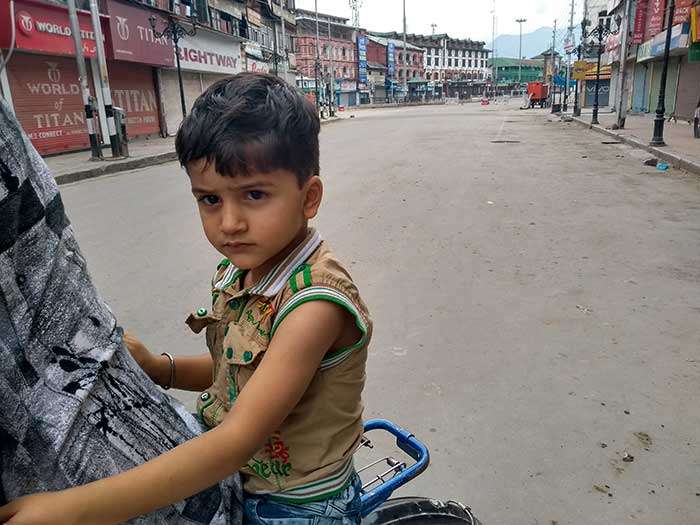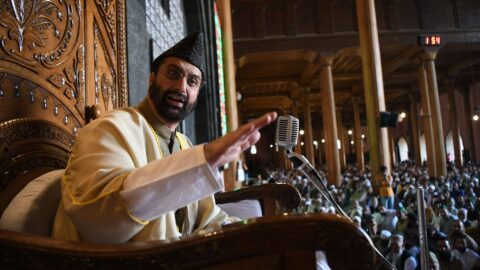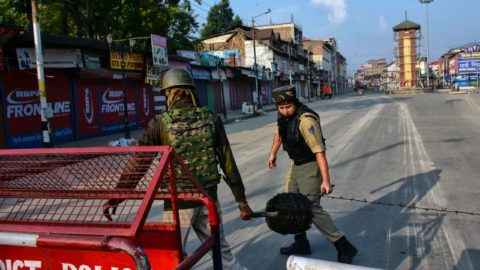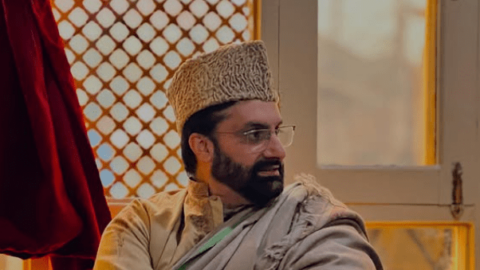On December 27th, Mirwaiz Muhammad Umar Farooq, was barred from leaving his house to lead…
Kashmiri Families Grieve For Missing, Arrested Young Sons
By Taha Zahoor- Religion Unplugged
PULWAMA (REPORTER’S NOTEBOOK)– As we drove towards the main market of Khrew in the Pulwama district of south Kashmir, 30 km from the capital Srinagar, the tension in the air was impossible to ignore. There was very little traffic. All shops and business establishments in the main market were closed, their metal sliding doors chained shut over their entrances.
Small groups of people sitting on the road sides discussed the present situation in Kashmir. Most were angry. One issue prominent in those street chats was the arrest of a large number of Kashmiri youth since Prime Minister Modi’s Hindu nationalist BJP-led government unilaterally removed the state of Jammu and Kashmir’s autonomy on Aug. 5, downgrading it to a territory and opening up the Muslim-majority region for greater Hindu settlement and business. Since that time, a communications blackout has halted the region, removing access to the Internet, mobile phone networks and most landlines. Hospitals have run out of medicines, curfews keep most families indoors and protesters have been injured by security officers.
People in groups came to us Kashmiri journalists to report their relatives or neighbors who had been arrested in the past two weeks.
Taha Zahoor
We were told at least 15 young men and boys have been rounded up in Khrew and its adjoining villages. The Public Safety Act (PSA) allows people in Kashmir to be arrested and detained without a trial for up to two years. There have been reports of the police torturing youth arrested.
Sons arrested and detained, families not told where
We decided to visit one of the PSA-hit families. After walking for a couple of kilometers, we reached the house of 55-year-old Manzoor Ahmad Bhat. His 21-year-old son Sameer, who works as a truck driver, was arrested under PSA on charges of pelting the police with stones. Stone pelting in Kashmir is common among youth while protesting, either as a response to pellet fire by security forces or an expression of discontent and effort to push away the army and police. Many arrested also say they never threw stones and were mistaken for someone else.
The grieving family tells us just a few days before Eid, Islam’s biggest celebratory festival, there was a midnight knock on their door by a group of policemen. They were looking for Sameer. When they didn’t find him, in exchange, they took away Manzoor, a father to four other boys and a girl, and set Sameer’s surrender as the condition of his release. The next day, on Aug. 9, Sameer handed himself to the police and Manzoor was released.
What followed was a long and arduous journey for Manzoor and his family to track down their son. A day after his arrest, on the day of Eid, the family decided to go to police station to spend some time with Sameer and to have tea together. But Sameer was not there. The festival day was spent searching for Sameer from police station to police station in Pulwama. They were told that he has been moved to another police station in Pampore, 10 kilometers from Khrew. He was not there. Next, they went looking for him at the police station in Awantipore, 25 kilometers away, but again, Sameer was missing. Ten days after Sameer’s arrest, his family found him in the central jail of Srinagar.
“We are hopeful that Sameer will be released,” Manzoor said. “We have approached the High Court to quash the PSA.”
In India, many file petitions to courts directly to change laws faster or request a quick ruling on the law’s fairness in a particular situation, like someone’s unjust arrest, without a trial, which would take years.
“We don’t know whether he is in Kashmir now or has been sent outside Kashmir,” Manzoor said.
At the home of Mohamamd Kamal Ahangar, everybody looked grim and worried. The family told us that an army team came to their house late in the night last week looking for Shahid Ahangar, one of Mohammad’s sons. Shahid, in his twenties, is a driver. Since he was not home, they arrested his brother Gowhar Ahangar.
Shahid is a known supporter of National Conference, a Kashmir-based political party that advocates for fair elections under Indian rule and includes two former state chief ministers as members, Omar Abdullah and Farooq Abdullah, both on house arrest since Aug. 5. Shahid still hadn’t turned up at the time of this article and Gowhar, also a driver, has remained in jail.
“We were seen as villains by the militants during the elections for supporting a National Conference candidate during Indian parliament elections, but now security forces are arresting us,” said Mohammad, Shahid’s and Gowhar’s brother.
And then there are those who haven’t been arrested yet but live under a perpetual threat of getting arrested. Our third stop in Khrew was the home of 30-year-old Irfan Ahmad Lone. For the past few weeks, he has daily visited his local police station in Khrew, on a kind of probation.
Irfan says the police have put him on a list of possible “trouble-makers” and after arresting him, released him on “Istighasa,” a term used for people detained by the police on the basis of suspicion (without evidence of a crime committed) and released after a certification by a magistrate, but kept under watch.
Irfan was booked in a case of stone pelting security forces in 2016 but released, like hundreds of other Kashmiri youth booked for stone pelting, under an amnesty scheme announced by the then BJP-coalition-led government.
Kashmir witnessed massive unrest after the killing of the pro-separatist Kashmiri militant Burhan Wani in 2016. The region remained locked down for months. Close to 100 youth died in violent clashes, mostly by security forces firing pellet ammunition to deter and stifle protests.
Irfan believes he’s a suspect not because of stone pelting but because of his association with National Conference. He’s the office assistant of Justice Hasnain Masoodi, the National Conference member of parliament from the Anantnag constituency of Kashmir. During the general election in May, militants from Jaish-e-Mohammad, a jihadist terrorist group active in Kashmir and Pakistan, came looking for Irfan at his home while he was gone.
“Right now, I think militants won’t target me, but I fear that a PSA [Public Safety Act charge] will be slapped against me and I will be sent to some other state outside Kashmir,” he said.
As the day ended and darkness fell, we packed up and drove back to Srinagar. On the way, we saw more people in groups out on the roads talking and discussing the day’s news of arrests and uncertainty.
The next morning, we drove to Bandipore in North Kashmir, 60 km from Srinagar. The scene was similar to South Kashmir. The town was closed. Some private transport was visible but public traffic was off the roads. In Bandipore, we met the family of Bashir Ahmad.
Bashir’s 21-year-old son Aadil Ahmad Mir was arrested in another night raid on Aug. 7 by the security forces, charged under PSA like the others. He has a disability that allows only partial movement in his arm. Bashir was briefly arrested for stone pelting seven years ago, and though he used to work with a militant group, he renounced that life and has been a local leader of the Congress Party, the national rival political party to the BJP.
“We have approached the High Court,” said Bashir, Aadil’s father. “Our lawyer has attached his handicapped certificate with the petition.”
While Bashir talked about his son’s arrest, Aadil’s mother Zareefa sitting nearby began sobbing. “Will he be brought back to Kashmir?” she asked, unsure of her son’s whereabouts.
Not clear why some are released and others remain detained
But while many are being arrested or fear an imminent arrest, there are others who have been released just days after they were arrested. There doesn’t seem to be any reasoning other than those who are politically associated tend to remain detained.
27-year-old Showkat Ali runs a cement store in the Bandipore and was released five days after he was arrested three weeks ago. He’s been arrested several times in the past on charges of stone pelting. Showkat says he wasn’t treated badly or tortured in police custody.
“The police party talked politely with me and took me away from my home,” he said. “I was arrested for 15 days in 2016 as well but I have not done anything adverse after that.”
Some 2,000 to 5,000 people have reportedly been arrested after the scrapping of Article 370 on Aug. 5. The government refuses to give figures about the number of arrests but insists if arrests are taking place, there are releases happening simultaneously.
Government spokesperson Rohit Kansal told reporters in Srinagar:
“We are facing a situation of cross border terrorism and public order. Now having been faced with these two situations, the local law enforcing authorities are taking a decision whatever is required to maintain order. These may include detentions, these may include arrests, but what is important to note is that these are law enforcement decisions taken at the local level, and two, these are decisions which are subject to a process of dynamic evaluation and re-evaluation. If there are arrests taking place, there are also releases taking place, for some people who are not posing a threat to peace and through whatever mechanism as may be necessary.”
So while the government explains detentions and restrictions on movement and communications in Kashmir as a step to prevent violence from taking place, on the ground, this is seen as silencing a population. For now, Kashmir seems to be dealing with an uneasy calm and staring at an uncertain future. There is anger. There is fear.
Taha Zahoor is a Kashmiri, Srinagar-based journalist. His name has been changed to protect his identity.
Photo courtesy: Counter Current
